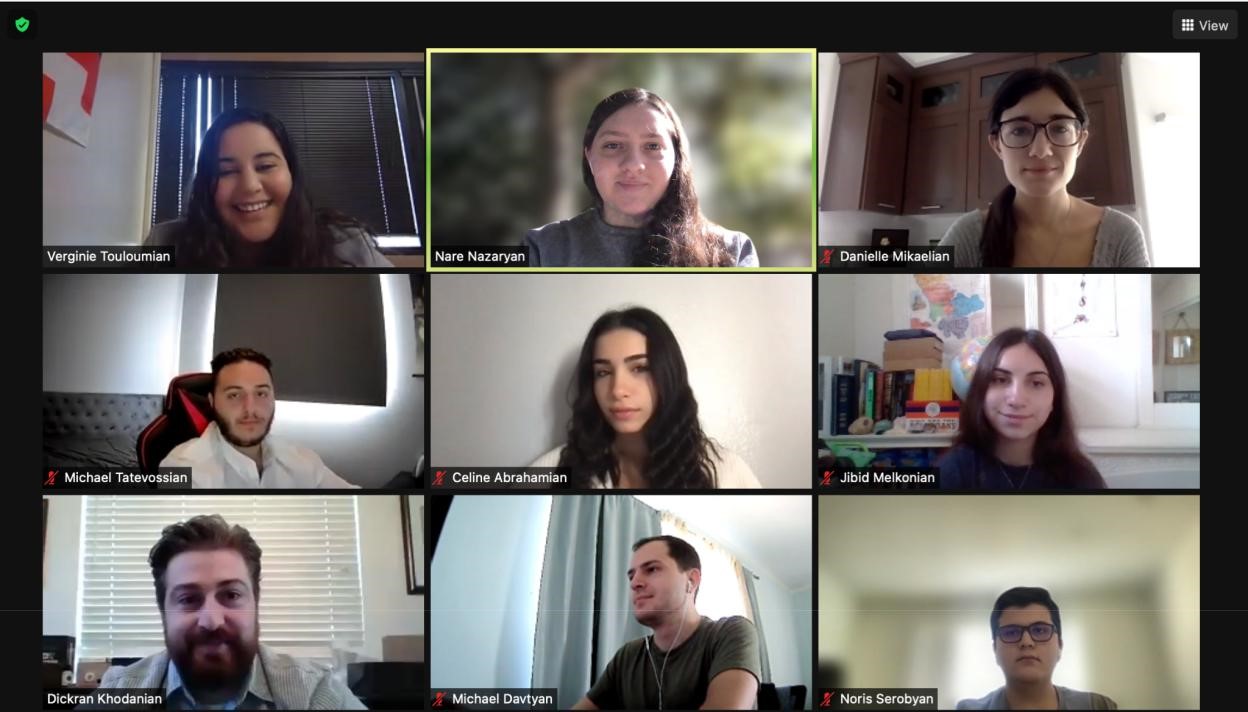Nare Nazaryan
Tuesday, October 19, 2021: Dickran Khodanian
The first meeting we had this week was a lecture from Mr. Dickran Khodanian, the former Communication Coordinator at the ANCA-Western Region. He attended California State University of Northridge, with a Bachelor’s degree in History and Armenian Studies, before receiving his Masters Degree in History from Boston University. Mr. Khodanian spoke to us about the history of Javakhk, which is now considered part of Georgia, even though it was historically part of multiple Armenian dynasties. He explained that there was a shift in the Javakhk commmunity during the last 200 years due to the aftermath of early massacres and the Armenian Genocide. In the 1830s, families left Western Armenian villages to relocate to Javakhk, increasing the Armenian population there. While previously there was Eastern Armenian and Russian influence in Javakhk, Western Armenians arriving created a mixed culture. Thousands more fled to Javakhk during the Genocide. In 1918, Armenia struggled to keep part of Javakhk and a series of battles took place to reclaim Javakhk from Georgia. Georgia also tried to claim Lori from Armenia. While Armenia kept Lori, Javakhk stayed with Georgia and continued to stay with Soviet Georgia during the USSR. After the fall of the USSR, Georgia declared independence and the Armenians in Javakhk experienced rampant unemployment and racism. Many Armenians then left Javakhk, while Georgia allowed Meskhetian Turks to repatriate. In recent years, there has been an effort to push more Armenians out.
Mr. Khodanian also emphasized the importance of connecting with and helping the Armenian population of Javakhk, especially because they feel isolated from the rest of the Armenian community. He described the work of humanitarian organizations such as the Armenian Relief Society, which funded youth centers and provided funding in healthcare and education for Armenians in Javakhk. The ANCA has also allocated funds to Javakhk Armenians; however, the Georgian government continuously prevents aid from reaching them. Furthermore, there are instances demonstrating the racism toward Armenians in Georgia, such as when the statue of an Armenian freedom soldier was met with protests from Azeris. Mr. Khodanian also spoke about Camp Javakhk, a two to three-week youth camp in Javakhk of about 500 children, which aims to teach them English, Armenian history, dance, songs, etc. He explained ways in which we can help the Armenians in Javakhk: taking part in Camp Javakhk, visiting Javakhk to help the economy of the local Armenians, and doing more research.
Finally, during the question and answer session, one of the interns asked if there was a threat of Georgian assimilation for the Armenians in Javakhk and Mr. Khodanian answered that as of now there is not, but it can occur in parts of Javakhk in the future. Another intern asked, “How do Armenians and Azeris fare in these towns?” to which Mr. Khodanian answered that in Javakhk, it is difficult to travel around because there would be fights/arguments between locals due to the racism and threats directed at Armenians by Azeris and Georgians.
Friday, October 22, 2021: Negotiations
On this day, we met for a negotiation simulation, which was similar to a Model UN meeting. Prior to attending the negotiations, all of the interns were given materials to prepare: instructions, our country’s position on four main issues, and the scientific article we would be using to direct our conversations. There were representatives of countries/groups of countries present, as well as representatives from non-governmental organizations at the meeting. We began with giving brief opening statements, holding formal discussions, and then having informal conversations centered around the effects of global mercury emissions and what measures we would take in response. After a couple of hours of debating, we reached a consensus on the four main issues, while also pushing each country’s interests.
We really enjoyed getting the chance to experience what the negotiation process entails and the politics behind negotiations. Our participation not only helped us learn more about the process, but also put us directly in a situation where we had to determine how to achieve the best outcome based on our own interests, as well as the interests of other countries. It was eye-opening to say the least!
Friday, October 29, 2021: ANCA D.C. Programs
On this day, the interns met with Alex Manoukian, the Programs Director at the ANCA Washington D.C office, as well as another ANCA intern in Washington D.C, and three ANCA Gateway fellows. We asked the intern and fellows questions about their respective programs and got to know them better. They also got a chance to give us tips regarding interviews based on their experiences, such as making sure to thoroughly research the company or organization you are interviewing for. Then, Mr. Manoukian presented the different programs the ANCA Washington D.C office has to offer, such as the Haroutioun and Elizabeth Kasparian Summer Academy, the ANCA Rising Leaders, the Leo Sarkisian Summer Internship, and the Hovig Apo Saghdejian Capital Gateway Program. The ANCA Rising Leaders program is a three-day seminar focused on career empowerment, civic education, and the Armenian identity. The Leo Sarkisian Summer Internship allows college students to participate in a six-week program in order to gain the skills needed to advance the Armenian cause on all levels. After an intensive application process, the interns are able to work on individual projects and gain hands-on experience within the American political system. Finally, Mr. Manoukian spoke about the Capital Gateway Program, which helps young Armenian professionals secure permanent jobs and internships in D.C. The program offers housing, mentorship, seminars, networking opportunities, professional development, mock interviews, and office space. Lastly, We ended the meeting by playing a fun game of Kahoot, which tested historical/political facts!



